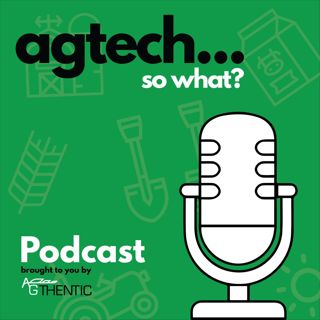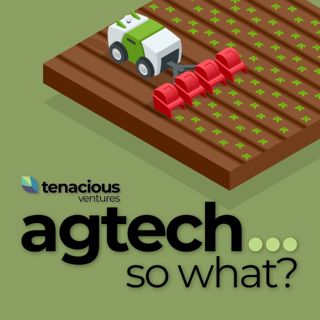
On-Farm Climate Risks and the Future of Ag Finance with Clay Govier
For a year that has already seen so much downside for US farmers in the form of extreme weather - from droughts to soaring temperatures - there’s another risk looming: rising interest rates. Adapting to an increasingly unpredictable and extreme climate is not cheap or easy. For farmers planning for the resilience and longevity of their business, the intersection of climate and fiscal risk has us wondering: how are farmers financing future growth, and where does resilience to climate change factor in?This week’s bonus episode gets into the details of how one farmer is planning for growth in the midst of enormous uncertainty. Clay Govier is a multi-generational farmer in Nebraska growing a diversified mix of grains, and he joins to speak about:Extreme weather in 2022 - What Clay’s exposure to heat and drought has meant for his business this yearFinancing resilience - What financing options Clay and his family have used for generations, and what is driving change in the futureGenerational transition - Why the $500B of US farmland changing hands in the next 10 years is driving new strategic thinking from farmersAlternative financing models - What the risks, opportunities, and skepticism looks like toward new modes of finance For more useful resources, visit our website.
12 Okt 202230min

Legacy Finance Eyes Agtech, with Wells Fargo
While early-stage agtech tends to play in the venture world, it pays to check in with how folks sitting in banking think about their role as partners to startups. Traditional lenders can draw on the best part of a century of connection to agriculture, and potentially offer significant options for financing the growth of later-stage companies.This week we heard from Romie Basra, Senior VP, National Sustainable Tech Practice Leader, and Karol Aure-Flynn, Food and Agribusiness Industries Advisor at Wells Fargo. As investors and lenders in traditional agriculture, as well as to other tech movements that have boomed (and busted) in recent memory, Romie and Karol joined to speak about:Cleantech vs. agtech. How investors in the previous waves of cleantech think about the challenges facing the new generation of startups in agFinancing options for startups. What role a legacy provider of finance like Wells Fargo wants to play for growing agtech companiesScaling in indoor ag. How a bank thinks about the barriers to scale for companies in a space like indoor agricultureValue props to institutional lenders. Why the “unsexy” elements of startup scale matter most to institutional lendersFor more useful resources, visit our website.
5 Okt 202228min

Systems Thinking and the Legacy of Big Food, with Dr Nigel Hughes, Kellogg
The decisions by major food companies impact consumers, farmers, and the environment at every stage of the agrifood value chain. But the status quo strategies of ‘Big Food’ don’t always acknowledge the complex, interconnected systems at play around the world.Our guest this week is Dr. Nigel Hughes, Senior Vice President of Global R&D at Kellogg. After spending a career in what he would unwillingly call Big Food, Nigel now advocates for the urgent recoupling of the many smaller systems, from farming to processing to distribution, that have become detached as they’ve been optimized over decades.For more information and resources, visit our website.
21 Sep 202232min

Changing the Risk Profile of Agriculture: a farmer's perspective on parametric insurance
We recently launched a three-episode deep dive into the future of risk and insurance in agriculture. Over the course of the series, we heard from one listener who offered to share his experience using novel insurance products to manage the risks of both too little and too much rainfall in his own farming operation. This from-the-field perspective was packed with insights, and was such a powerful contribution to our learning that we asked his permission to use the audio for this episode.Tom Ferguson is a farmer in Northern New South Wales, Australia, and this week you’ll hear a conversation between him and Tenacious Ventures Co-Founder Matthew Pryor. They speak about:Tom’s specific exposure to climate-risk, and why this has led to him exploring new options for insuranceHis process for collecting data, identifying high-impact risks to hedge against, and using this data to strike tailored, parametric policies with insurersWhat the impact of using more data on the farm can be for new insurance products, and what’s holding back the integrationHis adoption of new agtech on the farm, and what factors enabled or inhibited uptake within the business.For more information and resources, visit our website.
7 Sep 202233min

What Commodity Agriculture Can Learn from Organic Farming, with Amy Bruch, Cyclone Farms
While the term “organic” tends to be associated with small-scale production and a preference for manual tools over the latest technology, organic farming advocates claim their methods can reduce the need for expensive inputs like fertilizers and herbicides, improve soil health, and allow farmers to differentiate their product in otherwise global commodity markets. So, what can commodity agriculture learn from organic farming? Our guest this week is Amy Bruch, a sixth-generation farmer of row crops, small grains, pulses, and oilseeds, and 2021 Organic Trade Association Organic Farmer of the Year. After starting her career as a systems engineer in food manufacturing, Amy travelled to work on large-scale soil improvement projects in Brazil. This experience “farming in another postcode” then led to her approach managing the family farm back in Eastern Nebraska, and turning nearly 2,500 acres into organic production.In this episode, Amy talks about:How her experience improving degraded, acidic soils in regional Brazil makes her a better farmer at Cyclone Farms todayThe benefits of combining organic production techniques AND new innovations in technologyHow a focus on soil health is a gateway for more farmers to not only sequester more carbon, but also realize meaningful benefits for their crops & bottom lineWhy current organic farming standards are a potential onramp for farmers to adopt more “climate smart” agricultural practicesFor more information and resources, visit our website.
24 Aug 202233min

Defining the Future of Ag Advocacy, with Emma Germano, Victorian Farmers Federation
Agriculture is exposed to a complex tangle of laws, trade agreements, and competing visions of the future. For farmers, adjustments by legislators at any level of government can have an impact. So while policy is often an afterthought for operators in tech, the pressure for farmers to be engaged and represented in the formulation of new policy is real.It’s for this reason that ag has always invested deeply in advocacy groups. Our guest this week is Emma Germano, President of The Victorian Farmers Federation (VFF) and Managing Director of her family’s fruit and vegetable business, I Love Farms.Almost two years into her tenure as President of an advocacy group that positions itself as “the voice of Victorian farmers and rural communities,” Emma joins us to speak about:What interests and skills led her to advocacy and working with the VFFThe role of ag advocacy groups and the ROI they deliver for growersWhy advocacy groups are under pressure to engage a new generation of members in regional communitiesWhat Emma sees as the central issues for Australian agricultural advocacyFor more information and resources, visit our website.
10 Aug 202228min

Bonus Ep: Audience Responses to "The Three Fears of Farm Data"
Back in May, we published an experimental bonus episode called “The Three Fears of Farm Data”. The conversation centered around the legitimacy of fears held by farmers about sharing their farm data, and kicked off with a particularly hot take:“We in agtech have completely f*****d farmers by making them afraid of sharing their data.”The episode got a huge reaction from around the industry - both positive and critical. It’s clear that the conversation around farm data is one that everyone in agtech, from farmers and startups to analysts and operators in agribusinesses, seem interested in continuing.Our latest bonus episode features Tenacious Ventures Partners and Co-Founders Sarah Nolet and Matthew Pryor analyzing the wide range of reactions that have been sent through over recent weeks. They’ll be discussing responses from:Bernie Byrnes, farmer and 2020 Nuffield ScholarEric Taipale, CTO at ag insights platform Sentera Dan Shultz, agtech marketerNigel Kleinschmidt, agtech industry professional and friend of the showPip Grant, an operator and listener working in agtech and researchRhishi Pethe, author of Software is Feeding the WorldIt was the engagement of our audience that made this episode possible, and we are deeply grateful to these contributors and to everyone else that submitted a response we did not get to include. If you loved this week’s episode or hated it, get in touch. We might ask you to be on next!For more information and resources, visit our website.
3 Aug 202234min

The Three Categories of Autonomy in Agriculture, with Andrew Bate, SwarmFarm Robotics
Autonomous farming equipment and robotics in ag is more crowded than ever. Every new acquisition from an incumbent or deployment of venture capital into the space creates more buzz to sort through in the inboxes of analysts, entrepreneurs, and farmers.With the industry growing so quickly, it’s helpful to have a bird’s-eye view of what’s happening, and what it means for the future of agriculture.So, in this week’s episode we give listeners a framework to understand the rapidly moving world of autonomy in ag. Our guest is Andrew Bate, Co-Founder and CEO of SwarmFarm Robotics, who joins us to share his observations on the three major categories of autonomy that are emerging in ag.Drawing on his experiences as a farmer and founder, and insights from SwarmBot customers around Australia, Andrew speaks about:How his experience growing the family farm led to the creation of SwarmFarm RoboticsWhat three categories are emerging in the marketplace of autonomy in agricultureExamples of the new farming practices that autonomy unlocksHow SwarmFarm Robotics’ plan to scale differs from the dealership modelFor more information and resources, visit our website.
27 Juli 202235min






















